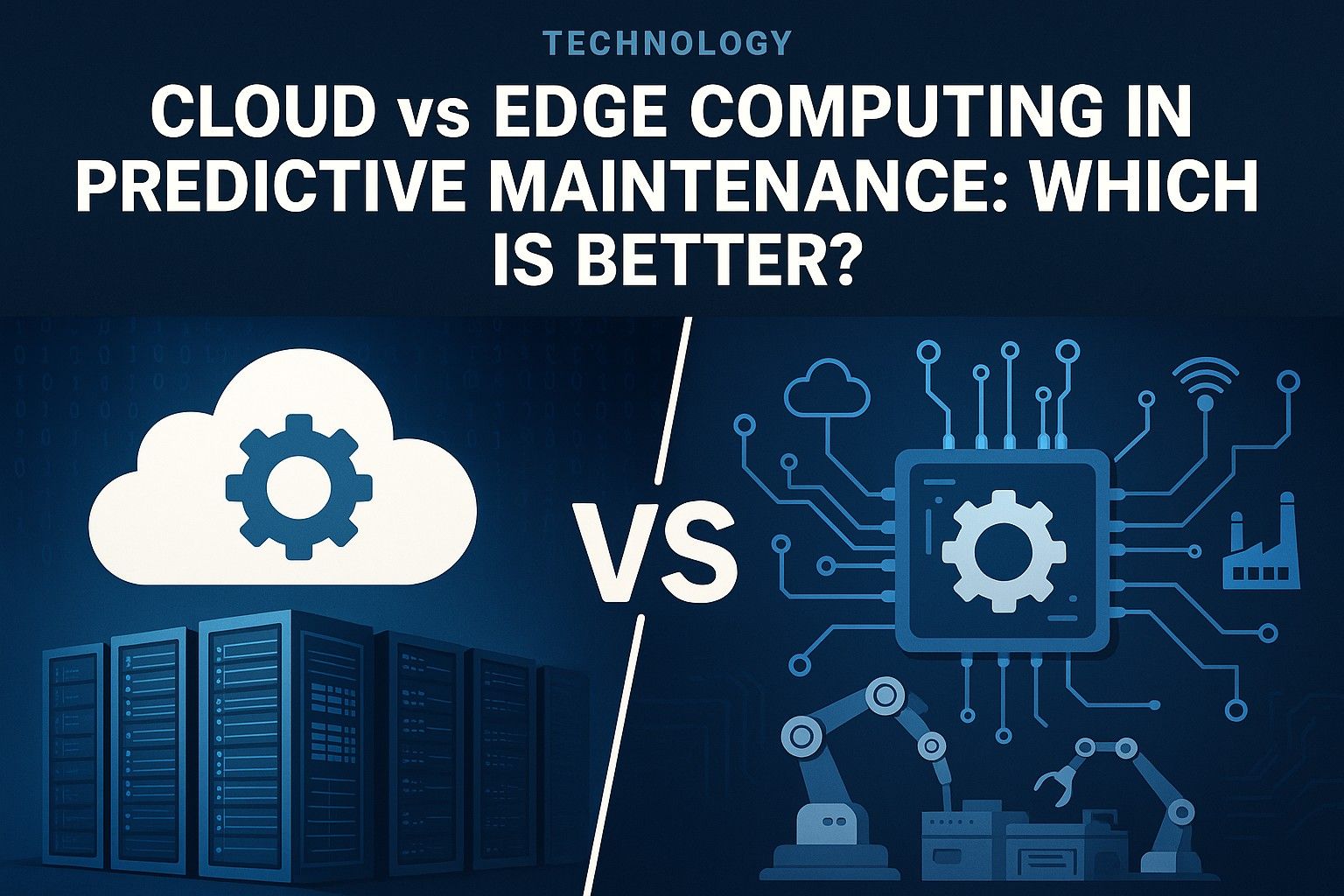Your maintenance manager delivers yet another costly update: "The packaging line motor burned out overnight—$45,000 in emergency repairs plus three days of lost production." You review last quarter's maintenance expenses—$180,000 spent on reactive fixes and unplanned downtime—and realize your small operation simply cannot sustain these unpredictable financial hits. Without predictive maintenance technology monitoring asset health in real-time, your SMB continues bleeding profits through preventable equipment failures that larger competitors avoid with advanced monitoring systems.
This financial crisis repeats across thousands of small and mid-sized manufacturing businesses as limited budgets force reactive maintenance approaches costing 3-5 times more than proactive strategies. The average SMB loses 15-25% of productive capacity to unplanned downtime, but predictive maintenance solutions now offer enterprise-grade capabilities at SMB-friendly prices, with cloud-based systems starting under $500 monthly.
Small manufacturers implementing affordable predictive maintenance achieve 35-50% reductions in maintenance costs while improving equipment reliability by 40-60% compared to traditional reactive or time-based maintenance. The transformation lies in leveraging IoT sensors, cloud analytics, and AI-powered predictions that detect equipment problems 2-8 weeks before failure—capabilities once accessible only to large corporations but now available to businesses of every size.
Ready to protect your SMB from $45,000 surprise failures that devastate quarterly profits?
Stop losing 15-25% of production capacity to preventable downtime. Discover how affordable predictive maintenance gives small businesses the same competitive advantages Fortune 500 companies have enjoyed for years—without enterprise-level budgets or complexity.
Understanding Predictive Maintenance for Small Business
Effective predictive maintenance for SMBs requires understanding the accessible technology ecosystem that transforms limited maintenance resources into powerful asset management capabilities. These solutions extend far beyond expensive enterprise systems to include affordable cloud platforms, wireless IoT sensors, and pay-as-you-grow pricing models specifically designed for small and mid-sized operations with constrained budgets and lean maintenance teams.
Traditional SMB maintenance operates reactively—fixing equipment only after failure—or follows rigid preventive schedules that waste resources on unnecessary interventions. Predictive maintenance continuously monitors critical asset conditions using affordable sensors and cloud analytics, alerting teams only when data indicates developing problems, typically reducing total maintenance spending by 30-45% while eliminating 70-85% of unexpected failures.
Affordable IoT Sensor Systems
Battery-powered wireless sensors monitoring vibration, temperature, and performance—no complex wiring required. Entry-level packages starting at $2,000-8,000 detect problems 30-60 days before failure.
Cloud-Based Analytics Platforms
Subscription software (starting $300-800/month) providing AI-powered predictions without expensive servers or IT infrastructure. Scales perfectly with business growth.
Mobile Alert Systems
Instant smartphone notifications when equipment conditions deteriorate. Enables small maintenance teams to respond proactively rather than fighting constant fires.
Automated Diagnostic Tools
AI assistants analyzing sensor data and recommending specific actions—no vibration analyst degree required. Turns any technician into a predictive maintenance expert.
Predictive Maintenance Investment Guide for SMBs
Establishing appropriate predictive maintenance investments requires understanding SMB-specific costs, ROI timelines, and scalable implementation paths. Unlike enterprise deployments requiring six-figure investments, modern SMB solutions offer flexible entry points enabling businesses to start small, prove value quickly, and expand monitoring as budgets allow and benefits materialize.
Small business predictive maintenance packages range from basic starter systems monitoring 3-5 critical assets to comprehensive facility-wide solutions covering entire production operations. Understanding these tiers enables better decision-making and ensures investments align with current capabilities while supporting future expansion.
| Solution Tier | Investment Range | ROI Timeline | Ideal For |
|---|---|---|---|
| Starter Package (3-5 assets) | $5,000 - $15,000 initial + $300-500/month | 6-12 months | SMBs testing predictive maintenance value |
| Growth Package (10-15 assets) | $15,000 - $35,000 initial + $500-900/month | 8-15 months | Small manufacturers with multiple critical machines |
| Facility Package (20-30 assets) | $35,000 - $75,000 initial + $800-1,500/month | 10-18 months | Mid-sized operations with comprehensive needs |
| Enterprise-Lite (30+ assets) | $75,000 - $150,000 initial + $1,200-2,500/month | 12-24 months | Larger SMBs approaching mid-market scale |
Cloud-based subscription models eliminate traditional barriers facing SMBs, requiring no server infrastructure, minimal IT support, and providing instant software updates. These modern architectures reduce total cost of ownership by 40-60% compared to legacy on-premise systems while delivering superior functionality and accessibility.
Financing options and equipment-as-a-service models enable cash-constrained SMBs to implement predictive maintenance without large capital outlays. Monthly payment plans typically range $400-1,200 for complete systems, making advanced asset monitoring affordable even for businesses with tight working capital constraints.
Start small and scale smart—successful SMBs typically begin monitoring 3-5 most critical assets, prove value within 3-6 months, then systematically expand coverage. This phased approach minimizes risk, builds organizational confidence, and ensures sustainable adoption without overwhelming limited maintenance teams or straining budgets.
SMB Predictive Maintenance Implementation Roadmap
Creating an effective predictive maintenance strategy for small businesses requires practical implementation approaches balancing limited resources with maximum impact. Unlike enterprise deployments with dedicated implementation teams, SMB success depends on simple, rapid deployment methods that deliver immediate value without disrupting daily operations or requiring extensive technical expertise.
SMB Predictive Maintenance Launch Process
Turnkey deployment packages specifically designed for SMBs reduce implementation complexity by 60-80% compared to traditional systems. Most small manufacturers achieve full operation within 2-4 weeks from purchase decision to active monitoring, with minimal disruption to production or maintenance workflows.
Sensor Hardware (40-50%)
Wireless vibration, temperature sensors with 2-5 year battery life—no electrician required for installation
Cloud Software (25-35%)
Monthly subscription for AI analytics, mobile alerts, and automated diagnostics—scales with asset count
Installation Services (10-15%)
Expert sensor placement and configuration—typically completed in 1-2 days for starter packages
Training & Support (8-12%)
Hands-on technician training and ongoing technical assistance—usually included in subscription
Integration Setup (5-8%)
Optional CMMS connection and existing system integration—recommended but not required initially
Vendor selection critically impacts SMB success—prioritize providers offering SMB-specific packages, transparent pricing, rapid implementation, and ongoing support included in subscription fees. Avoid vendors requiring long-term contracts, hidden integration costs, or complex enterprise-focused systems unsuitable for lean organizations.
Competitive Advantages and Business Growth Through Predictive Maintenance
Strategic predictive maintenance adoption creates disproportionate competitive advantages for small manufacturers competing against larger rivals. While big companies implement predictive strategies slowly through bureaucratic processes, agile SMBs can deploy, prove value, and scale solutions in months rather than years—turning size disadvantages into implementation speed advantages.
Customer confidence and delivery reliability improve dramatically when predictive maintenance eliminates surprise downtime. SMBs leveraging predictive capabilities report 35-50% improvements in on-time delivery performance, enabling premium pricing and customer retention rates previously achievable only through excess capacity investments.
Proven SMB Optimization Strategies
- Start with highest-cost failure assets—maximize ROI and build quick wins proving predictive value
- Leverage mobile alerts enabling small teams to monitor equipment 24/7 without additional headcount
- Use AI recommendations reducing diagnostic expertise requirements by 70-80%
- Implement cloud-based systems eliminating server costs and IT infrastructure investments
- Scale gradually from 3-5 assets to facility-wide coverage as budgets and confidence grow
- Document prevented failures and cost savings—build compelling business case for expansion
- Integrate with existing CMMS systems maximizing current technology investments
- Access remote expert support reducing need for specialized in-house expertise
Financial planning and cash flow management improve significantly through predictive maintenance eliminating surprise $30,000-80,000 emergency repair expenses. Small businesses transition from crisis-driven reactive spending to planned, budgetable maintenance investments improving financial stability and enabling growth capital allocation.
Workforce productivity and satisfaction increase when maintenance teams shift from constant firefighting to proactive problem-solving. SMBs report 40-60% improvements in maintenance efficiency and 50% reductions in after-hours emergency calls once predictive systems provide advance warning of developing issues.
2025 Predictive Maintenance Trends Empowering SMBs
- AI-powered "predictive assistants" providing expert-level diagnostics without specialized training requirements
- 5G connectivity enabling real-time monitoring even in facilities with limited WiFi infrastructure
- Subscription models under $500/month making enterprise capabilities accessible to smallest manufacturers
- Pre-configured industry-specific packages eliminating complex customization and reducing deployment time 80%
- Smartphone-based implementation requiring zero IT infrastructure or computer systems
- Vendor-managed services where providers guarantee uptime through predictive monitoring partnerships
Sustainability goals and environmental compliance become achievable when predictive maintenance optimizes energy efficiency and reduces waste. Small manufacturers using predictive systems report 15-25% energy savings through optimal equipment operation and 30-40% reductions in maintenance-related waste and disposal costs.
Growth scalability and acquisition preparedness improve dramatically when SMBs implement professional-grade asset management systems. Companies with predictive maintenance infrastructure command 20-35% valuation premiums during acquisitions, as buyers recognize reduced operational risk and modern management practices.
Conclusion
Small and mid-sized business predictive maintenance adoption represents the most significant competitive opportunity for SMB manufacturers since computer-controlled machining emerged decades ago. Organizations implementing affordable predictive strategies achieve 35-50% maintenance cost reductions while improving equipment reliability by 40-60%—transforming traditional SMB disadvantages into surprising competitive strengths through faster implementation and greater organizational agility.
Understanding modern predictive technologies reveals that cloud-based solutions, wireless sensors, and subscription pricing models have eliminated traditional barriers preventing SMB adoption. Entry-level packages starting under $10,000 with monthly subscriptions of $300-800 deliver enterprise-grade monitoring capabilities without enterprise-level complexity, costs, or implementation timelines.
Investment frameworks demonstrate that SMBs achieve 250-400% ROI within 18 months through prevented failures, optimized maintenance scheduling, and improved production reliability. Starting small with 3-5 critical assets enables risk-minimized deployment proving value quickly, then scaling systematically as budgets allow and benefits materialize.
Implementation roadmaps emphasize rapid, simple deployment enabling full operation within 2-4 weeks without production disruption or extensive training requirements. Turnkey packages and vendor-managed services reduce complexity by 60-80% compared to traditional enterprise systems, making predictive maintenance accessible even to manufacturers with minimal technical resources.
Competitive advantages extend far beyond maintenance cost savings to include improved delivery reliability, enhanced customer confidence, better cash flow predictability, and increased business valuation. The 2025 manufacturing environment increasingly rewards SMBs adopting predictive technologies while penalizing those maintaining reactive approaches that once seemed unavoidable.
The technology exists today, the pricing fits SMB budgets, the implementation takes weeks not years, and the ROI proves itself within months. The only remaining question: will your small business lead the predictive maintenance revolution, or watch competitors capture the advantages while you continue fighting preventable fires?
Ready to transform your SMB from reactive firefighting to predictive excellence that prevents 70-85% of equipment failures?
Every day without predictive maintenance is another day risking catastrophic failures that devastate quarterly profits. The technology that once cost millions now starts under $500 monthly—implementing predictive maintenance isn't about whether you can afford it, but whether you can afford NOT to have it protecting your business.









